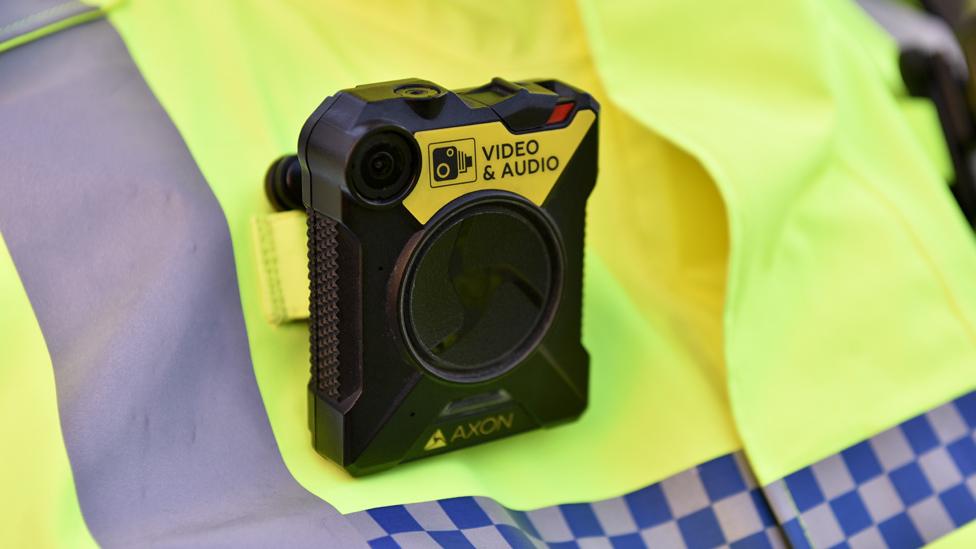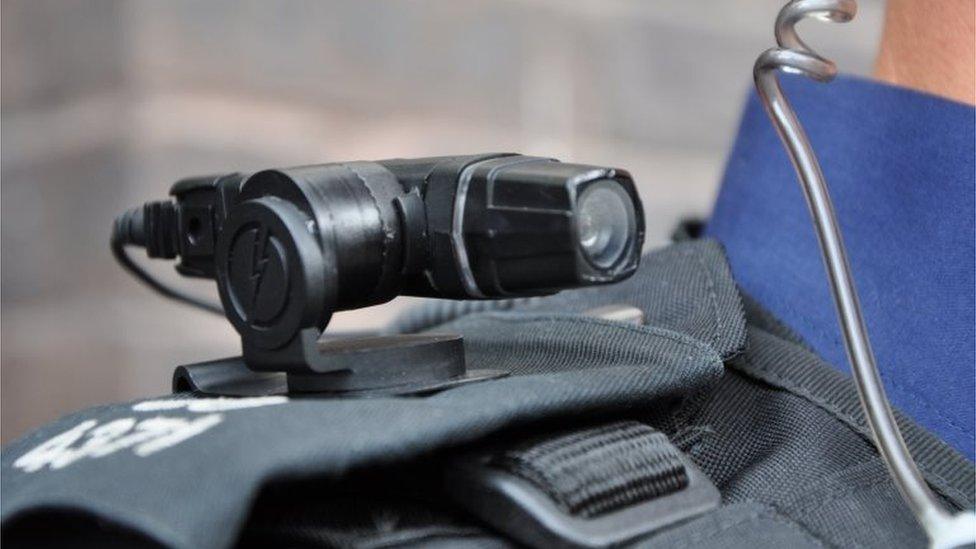Police officers mock body-worn video of semi-naked woman
- Published

The latest allegations came to light because of the actions of a student police officer
Police officers made "sickening" comments about an assault victim while watching body-worn video showing her groin, the BBC has learned.
The woman's body was exposed when she was filmed suffering from a seizure. Three Thames Valley Police PCs later watched the footage without reason.
None of the officers faced a misconduct hearing but a student officer who reported them was later dismissed.
The force says the remarks were "unacceptable" and PCs were sanctioned.
Warning: story contains language that may offend
The policing regulator says Thames Valley Police should have reported the case for independent scrutiny. The force has now done so, following our investigation.
Last year the BBC revealed that police forces have misused body-worn video, with officers switching off cameras, deleting footage and sharing videos on WhatsApp.
In our latest investigation we found:
The vulnerable woman was arrested and placed in leg restraints before being recorded on body-worn video while vomiting and losing consciousness
Officers watching the footage insulted her looks, used derogatory language about her genitals and discussed what they would need to be paid to sleep with her
The 22-year-old woman told the BBC she feels "betrayed" and believes officers should have been arrested
The student officer who reported his colleagues says the force covered up the incident, failing to inform the woman or the policing regulator about what happened
The BBC's previous findings about camera misuse were "truly shocking" and have already led to forces tightening up systems to prevent the deletion of footage, the chair of the Association of Police and Crime Commissioners, Donna Jones said.
She now wants mandatory rules for camera use which officers would be obliged to comply with.
'Sickening comments'
The latest incident - in Newbury, Berkshire - came to light because of the actions of a student officer, who we are calling Faisal to protect his identity. He had been called to a report of a fight while patrolling the town centre late at night last year.
The woman was arrested, handcuffed and placed in a police van by Faisal and two colleagues - a female PC and his male tutor, also a PC - after officers believed she had committed an assault.
On the way to the police station, the woman suffered a seizure which left her chest and groin exposed. The moment was recorded on officer body-worn video and the police van was redirected to hospital where she was "street bailed", meaning the officers left her there to be treated.
The next day, Faisal says, the female PC told him and his tutor she was cancelling the bail and taking no further action because CCTV of the fight showed that the woman had in fact been a victim of assault.
Later that shift, the female officer began viewing body-worn video of the woman's journey inside the van while at her desk in Newbury Police Station. Three male colleagues, including the tutor, gathered around her laptop and watched the footage while making "sickening" comments about her - according to Faisal, who was also in the room.
His witness statement, which we have seen, records the types of comments made by colleagues. He reports his tutor saying the woman had "crusty" or "manky" breasts, while another officer asked to see her "minge".
A fourth male colleague also joined a discussion about how much money officers would need to be paid to have sex with her. One suggested £500,000, another said £250.
Faisal says officers referred to the woman by name and were clearly aware of her identity - and watched the footage despite the female PC's decision that charges would not be brought.
"I just thought: 'This is a victim of crime, a person who we know to be vulnerable.' How can you talk about someone like that?"
The BBC spent months trying to find the woman. When we finally spoke to her, she said the force had not told her what had happened at the time. She told the BBC she wanted the public to know how officers had behaved.
"It makes me feel betrayed," she says. "The police are supposed to be the people you go to when you need help."
She believes officers should have been arrested - and the force investigated to find out if officers behave like this routinely.
'Disgrace'
Faisal says he felt obliged to report the officers' behaviour - even if he believed the culture in the force meant it would cost him his job.
"The fact I had to weigh up reporting what I saw against keeping my career is a disgrace," he says.
Following his report, an investigation was launched by Thames Valley Police's professional standards department.
Faisal says he was immediately "shunned" by colleagues and expected to leave. A sergeant showed him job adverts outside policing.
In August, he was told he was not physically or mentally "fitted" to be a police constable and dismissed.

Do you have more information about this story?
You can reach Noel directly and securely through encrypted messaging app Signal on: +44 7809 334720 or by email at noel.titheradge@bbc.co.uk

Faisal is insistent that the only failing he was ever criticised for was his first-ever arrest - when he agreed to momentarily release a suspect's handcuffs on the express advice of a senior colleague.
"I was dismissed for reporting misconduct - there's no doubt in my mind," he says.
The BBC has learned that none of the officers involved in the incident faced misconduct hearings - which would have been held in public.
Faisal believes the force acted deliberately to preserve its reputation.
"If I'd ignored what I saw that would have made me a corrupt officer."
'Horror story'
Thames Valley Police told the BBC that it was thankful the student officer reported what he saw, his disclosure had been treated seriously and the ending of his employment was an "entirely separate" matter.
In a statement, it said his tutor had no involvement in his probation after the whistleblowing report had been made. It added that the student officer had been moved to a different station, given a new tutor and supported through his complaint.
The force repeatedly refused to confirm whether one of the officers involved later joined its Protection Group - a team which provides security to the prime minister and royalty when they visit the area - only saying that none of them are currently a member of any close protection detail.
It also said some officers involved faced misconduct meetings - which are not held in public. But when the BBC requested anonymised details of any disciplinary outcomes under Freedom of Information law, the force declined to share them, saying disclosure risked identifying individuals.

Former chief prosecutor for the Crown Prosecution Service, Nazir Afzal says the case is "very troubling"
The case is "a horror story of misogyny and sexism" that is "massively" damaging to public confidence, former chief prosecutor for the Crown Prosecution Service, Nazir Afzal says.
His 2022 review into the culture of the London Fire Brigade recommended a roll-out of cameras across the service.
But he says the BBC's investigations have uncovered "systemic failings" in the scrutiny of police body-worn video - and the Newbury case is "very troubling".
"There is no doubt that this would have a significant impact on public confidence - in those circumstances, the [regulator] should be engaged," he says.
The woman's seizure while in police custody was reported to the regulator - the Independent Office for Police Conduct (IOPC) - under rules mandating such referrals. But at the time, the force did not voluntarily refer the officers' viewing of the footage and ridiculing of the woman.
The IOPC says the officers' behaviour will "no doubt" damage public confidence - and it would have expected the force to immediately refer the conduct for it to decide whether an independent investigation was required.
It added that this had now happened, following our investigation.
'Used appropriately'
The BBC has uncovered other instances of footage being misused.
We learned that Bedfordshire police deleted footage of a woman claiming an inspector had raped her, while an Avon & Somerset officer shared a nude image with colleagues on email.
The BBC can also reveal further concerns about the extent of body-worn video misuse, following on from the 150 cases highlighted in our previous investigation.
We asked all forces for records they held scrutinising the use of cameras - through information requests - but only Merseyside Police provided an extensive dataset.
It showed that 1,559 amber or red warnings were raised from 7,769 camera uses in stop and searches between 2020 and 2022 - one in five cases.
Donna Jones, who is also Police and Crime Commissioner for Hampshire and the Isle of Wight, says officers employ cameras appropriately in the majority of 18 million recordings made each year - but mandatory rules are now needed.
The Home Office declined to say whether it had plans to introduce changes - but said existing guidance on standards was already governed by data protection law.
A spokesperson said that while the vast majority of officers work tirelessly to keep the public safe, action must be taken "swiftly" to address failings.
Related topics
- Published28 September 2023

- Published29 September 2016
